Peter MALONE
Saturday, 18 September 2021 19:49
Transcendence
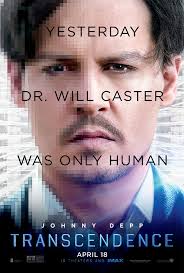
TRANSCENDENCE
US/UK, 2014, 119 minutes, Colour.
Johnny Depp, Rebecca Hall, Paul Bethany, Morgan Freeman, Cillian Murphy, Clifton Collins Jr, Kate Mara, Lucas Haas, Cole Hauser.
Directed by Wally Pfister.
This is a science fiction film, executive produced by Christopher Nolan, director of the Batman films as well as the ingenious Inception. The director, first time, is Nolan’s director of photography, Wally Pfister.
The scenario takes us into the future, perhaps the near future, because so much of the world is recognisable here. But it begins ominously with Paul Bethany as Max, a brain scientist informing us that the Internet has been turned off some years earlier and the society has to a rather primitive state. He then goes on to explain what happened those years ago and what happened to his friends, Will and Evelyn.
Will is a leading scientist, working on experiments on the human brain and personality. His wife, also a scientist, assists him in that work but has a vision for improving the world. We hear lectures from them, they are well received, work is going on in their laboratories, a visit from army connections and friends (Morgan Freeman and Cillian Murphy) – and then the laboratories explode and there is an assassination attempt on Will.
Will is played by Johnny Depp, in his serious vein in such films as The Ninth Gate, Sleepy Hollow, quite the opposite of Willie Wonka and Captain Jack Sparrow. Because of his advances in brain studies, his brain is able to be kept alive while connected to machines, even television monitors, which enables Johnny Depp still to give a performance via the screens. Evelyn is played by Rebecca Hall, devoted to her husband, anxious to keep his brain alive, collaborating with him, but beginning to wonder when strange phenomena are associated with people with injuries, almost instantaneous healing, and Will be able to be connected to them, present through them. As the crowds queue, Evelyn and we wonder what his intentions are, building up an ultra-strong group of healed humans, he controlling them, in an almost fascist-like way.
The rebels who were anti-artificial intelligence (but not against violence and assassinations in imposing their will) are still working against Will, prepared to sabotage his extensive underground laboratories, energised by a vast array of solar panels. Once again the army representatives, but this time not sympathetically. This creates an enormous dilemma for Evelyn, between her still strong love for her husband and the need to control his amassing power.
While Wally Pfister is able to direct his own director of photography to create beautiful images, his storytelling technique is quite slowly paced, even solemnly paced, which runs the danger of not enticing its audience to identify with the characters, the issues and the development of the drama. The musical score is fairly subdued, more soothing than invigorating. Ultimately, the plot developments are of sufficient interest to get most audiences involved even if not greatly enthused.
With the plot development of Will connected to technology, there are some echoes of the basic Frankenstein story, good intentions to create living creatures, but hubris taking over. There are many themes to reflect on, human life, the power of the scientist, the ‘playing God’ of those who wish to control life. And then there is the significance of the title. Will uses it to describe his developments in science and healing. The word indicates a surpassing of a previous state – and it also has religious connotations, of a power beyond the human, even of dignity.
Initial response to the film was not as enthusiastic as hoped for. But, it will take its place in the series of science fiction films which are not designed merely as big blockbusters.
1. Science-fiction? Science-fantasy? A future world? The tradition of this kind of intellectual science fiction?
2. The title, its meaning, Will and his idea of transcendence, moving forward in science and healing? The implications of human transcendence? Religious transcendence?
3. The modern world, lecture rooms, universities, laboratories? The touch of the future, underground laboratories, solar panels, the desert? The desert small town and its inhabitants? The lights going out, the Internet closedown?
4. The pace of the film, the plot growing on the audience, the musical score and its even pace?
5. The cast, Johnny Depp and his serious performances? The director, his work as a director of photography, bringing this experience to his direction?
6. The framework of Max, his narrative, no Internet, the primitive conditions in society? His memories of Will and Evelyn?
7. Will and Evelyn, their marriage, working together, science, his philosophy, her vision of changing the world? The initial lectures? The achievement, the applause? Yet the hostile members of the audience?
8. The laboratories, the experiments going on, humans, monkeys, brain work? The sudden explosions? The assassination attempt on Will?
9. Max and his friendship, support? Jack and Buchanan coming, the inspection, the military connections for experiments? Will rejecting this?
10. Will, the injuries to his body, the treatment in hospital, his being kept alive? The brain science? The possibilities for healing? His brain attached to the technology? The decision to do the experiment? The overtones of the Frankenstein mythology, creation of life, hubris?
11. Two years passing, Will alive, the television monitors, the link to the Internet? His presiding, continually seek continuing his experiments, Evelyn helping him, his going beyond her assistance? Her nightmares? His advice, the developments?
12. His plant, its extent, the underground laboratories and corridors, the solar panels in the desert? Martin and the attack by the thugs, his injuries, his healing, his physical abilities afterwards? Will and his being able to communicate through Martin, approaching Evelyn, the sexual possibilities?
13. Will’s intentions, the big queues of people coming for healing, the process of healing, the visit of Jack and Buchanan, seeing the range of people in their beds, the arm, the progress of healing? Will and his control, building an army, fascist dictatorship? Evelyn’s caution?
14. Jack and Buchanan, the military backgrounds, the friendship, coming to observe, the tour, the discussions with Will, leaving the note for Evelyn, wanting her to leave?
15. The group of rebels, anti-artificial intelligence, the underground bunker, the military plans for attack, Max joining them, seeing what uncontrolled brain science can do? The consciousness of being in the right, yet their violent methods?
16. Exploding the solar panels, the characters of the rebels, Bree and her militant intentions, the cannons, the chaos?
17. Evelyn, realising what Will was doing, talking with Jack and Buchanan and Murphy, the plan, the injection with the virus, her trying to persuade Will to perform the same process for her? The canons, her being shot, the injuries, her being put on life support, the connection with Will?
18. The visuals of the shining elements rising from the desert, assembling again, the panels being destroyed, the elements rising and their being re-consitituted?
19. Will, his achievement, death, Evelyn and her self-sacrifice?
20. The virus taking, the lights going out, and the collapse of civilisation? Possibilities for starting again?
Published in Movie Reviews
Published in
Movie Reviews
Tagged under
Saturday, 18 September 2021 19:49
Missing Picture, The/ L'Image Manquante
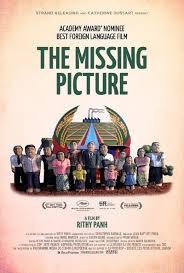
THE MISSING PICTURE/ L’IMAGE MANQUANTE
France/Cambodia, 2013, 92 minutes, Black and white and Colour.
Directed by Rithy Panh.
In the French version of this title, the word ‘manquante’ is more significant than the English ‘missing’. Manquante means ‘lacking’, that the picture is not just missing, it ought to be there. And some of the missing pictures for this film are those in the footage taken in Cambodia in the 1970s, the era of the Khmer Rouge and the killing fields of Cambodia, which no longer exists.
Director Rithy Panh was born in Cambodia in 1964. A young teenager during the troubled times, his parents and family were killed and he himself went into exile in France. In his career as a film-maker, he won awards for his film Rice People in 1994, a look at children who said they received their rice from the UN and had never seen a rice field. He subsequently made quite a number of documentaries and the fiction, based on the novel by Marguerite Duras, The Sea Wall, in 2008.
The Missing Picture was a nominee for the Oscar for Best Foreign Language Film for 2013.
The director supplies a voice-over, recalling his childhood, the appearance of the Khmer Rouge after quiet and cultural and literary times with his family. He shows some photos, incorporates footage taken during the period, especially from the propaganda films made by the Khmer Rouge. But, he is lacking pictures and footage of his family, especially the pathos of his father’s hunger strike and death.
He goes on to explain the ideology of the period, the stamping out of individuality, the attempt to create a society in which everyone was equal – but, was doomed to failure, as young people who were specialists were destined for particular work and the soldiers and authorities lived more comfortably than the ordinary people. We know that thousands were killed, and we know the reference to the killing fields, especially after the striking film of 1984 of that title.
The special device for the film is the director’s asking a friend to create claye models of persons, animals, painting them and the director using them to make tableau of particular scenes for which there was no photographic record. This means they offer a great pathos with audiences responding to the models and imagining what they stood for.
In retrospect, the regime of Pol Pot and the rule of the Khmer Rouge was a period of shocking brutality. This film reminds us that it should not be forgotten.
1. The director, his Cambodian background, exiled from Cambodia at a young age? His international career and filmmaking?
2. Memories, experiences, of Cambodia in the 1970s, the memories of childhood?
3. The history of Cambodia, the background of France and Indochina, the 1960s and the Vietnam war, the bombings of Cambodia by the Americans, the Khmer Rouge and their rule, Pol Pot and his dictatorship, socialism, agrarian socialism, the revolution, the camps, no individuality, the ethos and ideology, the indoctrination, the effect on the young, developing fanaticism, changes in the economy, experts and their being fostered, the limitations on food, prohibitions on fishing, selling mountain rice? The killing fields? The officials?
4. The footage of the period, the Khmer Rouge propaganda films and their making, compulsory screenings, compulsory audiences? The gaps in material available for this film? The idea of the clay puppets? The artist? Making them, shaping them? Painting them? Their size, brought into various scenes, the substitutes for the real people? The role of cinema and understanding of truth?
5. The director’s voice-over, his memories, aged 13, losing his family, recalling the history, dramatising it in the figures in the tableau? The impact of words and images?
6. Coming to terms with the memories?
7. The slogan: To keep you does no benefit, to destroy you is no loss?
8. The American bombings, Pol Pot using them as a justification for his behaviour?
9. The background of music, literature in the director’s family? The transition to hunger, persecution, his father’s hunger strike and death, the effect on the children, children denouncing their parents, the propaganda films?
10. The importance of this film as remembering the past? Its contemporary relevance?
Published in Movie Reviews
Published in
Movie Reviews
Tagged under
Saturday, 18 September 2021 19:49
Blue Ruin
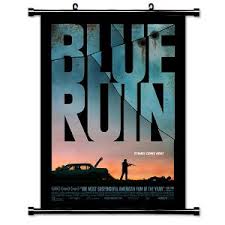
BLUE RUIN
US, 2013, 90 minutes, Colour.
Macon Blair, Devin Rattray, Amy Hargraves, Eve Plumb.
Directed by Jeffrey Saulnier.
Blue Ruin is an unexpectedly successful Gothic drama. It received quite some critical acclaim and was screened in the Director’s Fortnight at Cannes. Unfortunately, the small-budget did not lead to wide distribution, but it was seen in specialised circumstances.
The screenplay is able to lead the audience on, introducing the central character as wild and hairy, having a bath in the home of absent owners. He flees and the audience probably thinks the worst of him, scavenging in garbage for food, going to his old blue Pontiac car and living in it – but also seen reading. His name is Dwight.
When a policewoman comes to the car, we assume that he will be arrested. On the contrary, he seems to be well-known and is given information, with great sensitivity with the woman taking him to a police station, to tell him that his father and mother’s murderer is being released. We wonder what he will do.
He cuts his hair and shaves his beard, looking completely different from what he was at the beginning. He then goes and kills the ex-prisoner. This continues the feud between the family and Dwight and his family, his going to see his sister to make sure she was away from home while he waited for them to attack. In the attack, he takes one of the prisoner’s brothers and puts him in the boot his car, while he himself is wounded in the leg by an arrow – which leads to his buying equipment to sever the end of the arrow, but having to go hospital after he collapses from lack of blood.
He then continues his fight against the family because they are in pursuit. Dwight lists the help of an old school friend who gives him a gun, and saves his life when he is about to be killed. Then he has to confront the women of the family, one of them particularly vicious.
The film is well above average for this kind of drama, well written and performed, stylishly photographed and edited. Macon Blair, who appears in practically every scene, is quite persuasive as Dwight. Director, Jeffrey Saulnier, wrote, directed and photographed the film.
1. Critical acclaim? A Gothic backwoods genre film? Emphasis on character rather than horror and violence? The family feud? Vengeance? Ordinary people?
2. The title? Blue Ruins as gin cocktails? The old blue Pontiac, a ruin?
3. Small-budget, the director and his being writer, director of photography? The unknown cast?
4. The introduction to Dwight, in the house, in the bath, people coming, his running away, naked, getting dressed, scavenging for food, smelling it? Going to his car, the tent and the car, reading, sleeping? Going into the sea? His hair and beard, appearance?
5. The policewoman, coming to the car, the news about the release of the prisoner, her telling him in the police station, one-on-one so that he would not be disturbed? The mystery of the connection to the prisoner? Sending the card to his sister? His transformation, cutting his hair, shaving his beard, looking completely different?
6. The importance of his car, going to the prison, watching the release, the family welcoming the prisoner? Going to the bar, their celebration, going in, waiting in the toilet, his killing Will, the vicious stabbing, the blood spurting, on Dwight? His cutting his hand? slashing the tyre? the pursuit, taking the limousine? Discovering William in the back, letting him out, his running away?
7. The family not going to the police, keeping it in house, the nature of the feud?
8. After the killing, like travelling to see his sister, her reaction, the absence of years, the past history, the deaths of their parents, his having copy with her, confessing, hurrying back, the babysitter not answering the phone? Dwight getting his sister to leave with the children?
9. Dwight, hiding in the house, getting his sister away? Setting up the house, the darkness, the light, the water running?
10. The family group coming, the guns, the bow? Dwight being wounded in his leg? Shooting the brother? Putting him in the boot of the car? Driving? Buying equipment to remove the arrow, sawing it off? Going to the hospital, his recovery? Leaving? The stitches, his hobbling? Yet managing?
11. Seeking outt Ben, the discussions with his mother, her remembering the past? Finding Ben, at the club, his work there, their going home, discussions about the school annual, the photos? Reminiscing? Ben and the guns, the choice of the gun, the practice and Dwight not being a good shot?
12. Ben following Dwight, Dwight confronting the brother in the boot of the car, with his gun, missing him? The brother telling the truth, the fact that it was not the dead brother who had killed the parents, but the significance of the affair, the older man wanting to kill Dwight’s father because of the affair with his wife? The woman in the car by accident and dying? the reversal of roles, the brother with the gun, Ben shooting and killing him?
13. Ben giving Dwight a better gun? Dwight visiting the cemetery, his father’s grave? Waiting in the house, the women coming, William? Their taunts?
14. Telling the truth, vicious, the shootings? Dwight realising that William was his half brother? Letting William go?
15. The consequences of the murders, the feud, the continued violence and its consequences, the initial wrong leading to destruction and death? A sense of realism? Pessimism?
Published in Movie Reviews
Published in
Movie Reviews
Tagged under
Saturday, 18 September 2021 19:49
Gardening with Soul
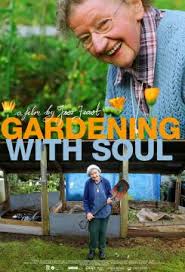
GARDENING WITH SOUL
New Zealand, 2013, 96 minutes, Colour.
Sister Loyola Galvin.
Directed by Jess Feast.
There is no doubt that most audiences will feel all the better while watching this interesting and delightful film. And they will probably even feel much better by the time it has ended.
Over the years, there have been many documentaries which feature nuns reflecting on their lives, reflecting on religious life, reflecting on their place in the church. Audiences in the past were used to seeing such movie nuns as Ingrid Bergman in The Bells of St Mary’s or Jennifer Jones in The Song of Bernadette. Catholic audiences were possibly surprised or exhilarated by nuns in different habits in the 1960w like Rosalind Russell in Where Angels Go, Trouble Follows or Mary Tyler Moore with Elvis in Change of Habit. In later years, many sisters have complained that screen presence of nuns, generally in antiquated-looking habits which never existed, is limited to background in airports, railway stations… In the 1990s, there was Whoopi Goldberg, masquerading as a nun in a witness protection program, singing and delighting everyone (including the Pope) with her singing and leading a choir in Sister Act. On the more serious side, Susan Sarandon won an Academy award for portraying Sister Helen Prejean and her prison ministry in Dead Man Walking. A fascinating half-century of nuns on screen from Ingrid Bergman to Susan Sarandon.
Sister Loyola, who is featured in Gardening with Soul lived her religious life as a Sister of Compassion through that half-century – and beyond. Serving as a nurse during World War II and then entering the convent, she is in her 80s as this film opens and turns 90 towards the end.
The Sisters of Compassion were founded by Mother Aubert, a woman of enterprise with an openness to people of all faiths and denominations. The sisters have communities in New Zealand, Fiji and worked in Australia, especially in Broken Hill.
Perhaps the first thing to note about Sister Loyola is what a livewire she is, sprightly and birdlike, working in the garden, cherishing the garden, not only the plants but also the preparation of compost, doing some heavy lifting, and enlightening us about the processes of growth, with images of beautiful flowers, shrubs, and what happens every year, from winter through to autumn, which are the headings of the action of the film.
Since this review is written by a non-gardener (after dismal failure in that job many decades ago in the novitiate), the impact of the garden and gardening was visual. Real gardeners will no doubt appreciate so much more, not just visually, but understanding and appreciating what Sister Loyola does, along with her helpers in the garden at the Home of, Compassion in Wellington, New Zealand.
At the title of the film also includes Soul. Sister Loyola is a wise guide in matters spiritual, indicating the depths of prayer and awareness of God over many decades, but able to speak in very practical terms, using garden analogies, using the seasons, but able to explain many aspects of spirituality to a wide audience, even those not familiar with spirituality terms and ideas. But Sister Loyola speaks from long experience. There is a beautiful sequences of the sisters at mass, distributing Communion, as well is the elderly sisters in the background, at prayer, at meals, and the joy of celebrating Sister Loyola’s 90th birthday.
The director behind the camera (not always easy to pick up with the limits of the sound engineering of the film) asks Sister to explain her life, the possibilities of marriage but her grief at the death of a friend during the war, her work as a nurse, her vocation, the old-style, rather strict convent life, the practical changes to the habit and its materials and the decision to live in a more contemporary world in ‘mufti’.
And Sister has sound things to say about the state of the church (mentioning the advantage of New Zealand being a long way from Rome!), of looking after children in the homes, on kindness and tenderness to babies and children (with some footage of a film from the 1950s). At the end of the film, some visitors who were children in Compassion Homes, come to visit Sister Loyola and share their happy memories of their experiences with the sisters, which enabled them to have a life that they might never have had without the sisters.
Sister Loyola is also up-to-date with troubles in the Catholic Church, speaking strongly about the sexual abuse issues, using the word ‘humanity’ in her strong reflections.
For Catholics who are familiar with nuns, this film will be a most pleasant experience, being reminded of the best that they have known in their relationships with the sisters. Audiences not familiar with nuns will be charmed by the sprightly Sister Loyola, her sharp observations on life, her experience of living religiously and spiritually. Probably this will be the case for audiences 50 and over reminiscing about sisters. There may not be an immediate appeal to younger audiences – but should they happen upon Gardening with Soul, they might not be sorry.
A pleasing documentary that is very easy to recommend.
Published in Movie Reviews
Published in
Movie Reviews
Tagged under
Saturday, 18 September 2021 19:49
El Gringo
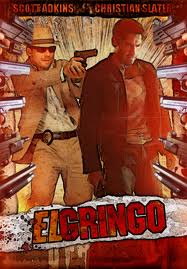
EL GRINGO
US, 2012, 99 minutes, Colour.
Scott Adkins, Christian Slater, Yvette Yates.
Directed by Eduardo Rodriguez.
The director of El Gringo is a Venezuelan director, working in a style that is a blend of spaghetti westerns and Quentin Tarantino films. All the characters are introduced with a visual of their names, a range of people from bandits and drug dealers to New Mexico police officers, guards at the wall border with Mexico, the people in a rather squalid town, the chief of police, the owner of the local bar, the leader of the gang, and young woman who wants to be part of the gang…
The action concerns a shootout at the Mexican border, with the central character, El Gringo, played by English born Scott Adkins, shooting a man in New Mexico, putting him in the boot of the car and setting it alight. He then walks to the border, intending to go to Acapulco with the bagful of money that he has taken, but finding himself in an ugly Mexican town. No one will sell him a glass of water, it emerging that the chief of police, on the take, intends to control the town, pays people to ignore the Gringo.
The woman who owns the local local bar, does have some pity on the Gringo because the people have burnt down her father’s bar. No one is willing to sell him a ticket to get out of town. He sits and waits, is set upon by gangs, kills off an extraordinary number of them – and is then confronted by a police officer, Christian Slater, antagonistic towards his superiors, who is actually in with the chief of police and is a bagman.
When all seems fatal for the gringo, he is helped by the woman at the bar, shooting the chief of police and Christian Slater – revealing that, contrary to what the initial impression was, he is a good and upright lawman.
This is a straight to DVD film, has some interest in its plot about drugs and the Mexican- American border, in showing Christian Slater as the sleazy villain and in highlighting the skills of the Gringo.
It raises issues of integrity, drug dealing, the law, and capitalises on the appetite of DVD viewers for action and violence.
Published in Movie Reviews
Published in
Movie Reviews
Tagged under
Saturday, 18 September 2021 19:49
Fading Gigolo
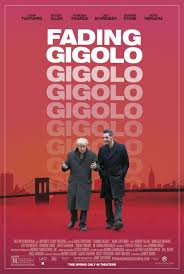
FADING GIGOLO
US, 2013, 90 minutes, Colour.
John Turturro, Woody Allen, Vanessa Paradis, Sharon Stone, Liev Schreiber, Sofia Vergara.
Directed by John Turturro.
Certainly an offbeat title. And the premise of the plot is rather suspect, though treated more gently than might be expected.
We are introduced to two characters, one in his middle age, the other older. They are played by John Turturro and Woody Allen.
Fioravante (Turturro) is a quiet character, who works in a flower shop and is an expert as at floral designs. He is helping his friend, Murray, packing up books because people are less interested in books these days. Murray has visited his doctor for a dermatology procedure and the issue has come up about sex, relationships and a menage and Murray has the bright idea that his friend, Fioravante, might respond to such requests and start a career as a gigolo. Murray is eager to be his agent – and even more eager not only to have an agent’s fee but, as waitresses do in restaurants, share tips.
This might not be the story an audience would like to watch – but, it is treated with more humanity than might have been expected, raises issues of sexuality and relationships, and does so with some humour.
There is little given about Fioravante’s background or why he should agree to take on this role. Seeing him with a number of clients shows his sympathy, kindness and regard for women. One is played by Sharon Stone, initially shy, but wanting revenge on her husband. Another is played by Sofia Vergara, who is in for the experience. But one woman he encounters is a widow from the strict Jewish community in Brooklyn, who stirs emotions in him as well as in herself.
It should have been said earlier, that the role of Murray is very much a typical Woody Allen character, full of anxious remarks, full of one-liners, keeping the audience very much amused with his worrying character and his style. And suddenly it is revealed that he has an African-American? wife and several children with whom he is a tender father.
This brings in the Jewish community, very strict in its regulations, Murray not fitting into their ideals. Liev Schreiber is one of the local equivalent of police, keeping an eye on everyone’s behaviour, even to arresting people and bringing them before a bench of Rabbis for judgement.
This means that there is a lot of comedy about groups in New York City, humour about this Jewish community, for instance, serious young Rabbis-in-the-making, refusing to be interested in or coached in baseball – but some relent!
The screenplay was written by John Turturro, who also directs, so it is a vehicle for himself, his character, his moral behaviour, his concerns, the experience of being a local gigolo and its repercussions for himself and his moral perspective.
A different New York story.
1. The New York story? Orthodox Jews? Italian community?
2. The settings, the streets, apartments, the shop, the park? The jazz score?
3. The title, Fioravante, his life, little background given, his talk about his mother, an ordinary woman? His age, the flower arrangements? The neutral morality?
4. Woody Allen as Murray, his character, one-liners, his typical delivery, human? The situations? His wife and children? Inter-racial marriage? At home, talking, playing with the children? The baseball? Lice and the children’s heads? Going to Avigal? Seeing the crash and the argument on the road? Fioravante helping him pack? Going to the dermatologist? Her proposal, the thousand dollars? The idea of the gigolo? Talking this over with Fioravante, trying to persuade him, the commission for agents, sharing the tips? Changing their names? Danny Bongo? Arrangements, the phone calls, the menage, teaching the Jewish boys baseball? Introducing Avigal to Fioravante, his being taken by the Jewish supervisors, taken to court, ringing his lawyer, relying on him in the case? The accusations? Avigal and her coming in, speaking? Fioravante and his leaving, the French woman in the cafe, prospects to continue the business – or not?
5. Fioravante, as a friend, robbing the shop as a boy, the flower arrangements, listening to Murray, the proposal, his self-image, and what women saw him, sexual attraction? The issues of payment? Going to Dr Parker, his tenderness, talking, the drink, the gentle dancing, her being persuaded? The different visits? With Selima, her energy, wanting things rough? The menage? His not wanting to follow through? Dr Parker seeing that he was in love? Avigal coming to see him, being different? The visit to his house, his cooking, slitting the fish? On the carousel, seeing her, sitting with her? The walk in the woods, revealing her hair, her breaking the laws, the kiss? Avigal coming to see him, the farewell, his interchange with Dovi?
6. Dr Parker, the dermatologist, her empty marriage, shyness, changing, the sexual encounter with Fioravante, vengeance for her husband? The cash and her being wealthy? Talking to Selima? The menage, recognising Fioravante in love?
7. Sophia, her character, bold, rough, the menage?
8. The different women and their going in to Fioravante, the collage?
9. Avigal, the Jewish widow, with the children for the lice, the rules for widows, covering her hair, the discussions with Murray, the connection with Fioravante, the visit, the love, the carousel, the kiss in the woods, speaking up in the case? The farewell to Fioravante, loving Dovi? His work with the patrol, with the rules, his lack of self-confidence? In love?
10. The Jewish patrol, Brooklyn, the crash and the anger of the driver, Dovi and his being part of this? The children, the rules, being busy, learning baseball? The court, the rabbis and the panel? The application of the rules? Listening to Avigal?
11. The credibility of the plot? Had it been a woman instead of Fioravante? Moral issues? Personal issues?
Published in Movie Reviews
Published in
Movie Reviews
Tagged under
Saturday, 18 September 2021 19:49
You Belong to Me
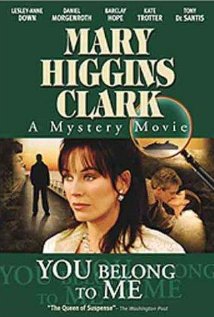
YOU BELONG TO ME
US, 2002, 95 minutes, Colour.
Leslie Ann Down, Tony de Santis.
Directed by Paolo Barzman.
You Belong To Me is the title of the very popular song of the 1950s, sung by Patti Page and Jo Stafford. It is a sentence that is engraved on a number of rings that are found on murder victims on cruises.
This is a Mary Higgins Clark story, a popular murder mystery, a stronger female lead, this time Leslie Ann Down, and a range of male suspects, the actual murderer being the least suspicious.
Leslie Ann Down plays a former police officer who has become a psychologist and has a talk-back radio program. This leads her to an investigation of the series of murders, and involvement of the murderer with her sister. Along the way, there are further murders, suspicious characters, especially the accountant of an ailing mother of one of the victims.
As expected, Leslie Ann becomes involved and it is herself in danger. Once again, these are the popular ingredients of Mary Higgins Clark novels.
1. The popularity of Mary Higgins Clark novels? The tone – availability to most audiences? Mysteries, characters, female leads, males ruthless?
2. The American cities, glossy presentation, radio stations, homes and apartments, art galleries, police precincts? The musical score?
3. The title, the popular song, the reference to the Pyramids, Algiers, the jungle wet with rain?
4. Susan, her radio work, conversations, contacts? Her past in the police? Her work as a psychologist?
5. The mother, concerned her daughter, the week? The title and the ring? The police work, tracing the rig, the dealer, the witness across the street, the dealer murdered? The victims with the ring?
6. The caller, trying to be anonymous, her husband, the secretary at the office recognising her? Her experience, the plan for the visit, the accident?
7. The victim’s mother, her terminal illness, her work with the curator, the exhibition, the funds, the foundation? The documents?
8. The accountant, his advice, suspicions, the embezzlement, arrested, not the murderer?
9. Susan and her interviewing other characters, the girl working at the diner, making the connection about the caller and her life? The various victims? Locating the places of the business, the cruises, according to the song?
10. Susan’s sister, marriage breakup, jealousy, dating the curator, his charm, preparing for the trip, becoming a victim?
11. The revelation of the killer, psychopath, type, smooth surface, sinister depths?
12. Susan, her character, involvement, saving his sister, working with the police, the past?
13. A satisfactory resolution?
Published in Movie Reviews
Published in
Movie Reviews
Tagged under
Saturday, 18 September 2021 19:49
3 Days to Kill
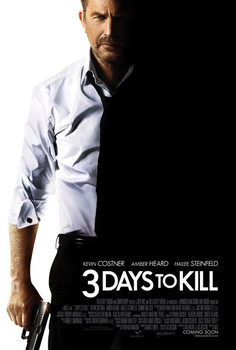
3 DAY TO KILL
US/France, 2013, 117 minutes, Colour.
Kevin Costner, Amber Heard, Hallie Steinfeldt, Connie Nielsen.
Directed by Mc G.
If you have two hours to kill, you might enjoy watching three days to kill! In fact, there is an ambiguity in the title, with a father having three days to spend with his estranged daughter, and his CIA involvement in an assassination attempt.
On the whole, the film is serious in its portrait of an ageing CIA agent, discovering that he is terminally ill, and wanting out of his work in order to re-connect with his family. His assignment is very serious indeed: an arms dealer, his agent with a dirty bomb, his accountant and other associates. But then, the film also has a lot of humorous touches, especially in the agent’s trying to deal with and understand his daughter who is at school in an international college in Paris. He is also benign to an agent whom he tortures but also relies on for advice about daughters. Put the two ingredients together and stir and you come up with this film.
It has been directed with flourishes by Mc G who made two Charlie’s Angels films a decade ago. It is based on a story by Luc Besson, who has made some classics, like Subway but who has also provided stories for quite a lot of action films including the Transporter series and a film which plays on similar themes but much less successfully, The Family with Robert De Niro and Michelle Pfeiffer.
The agent, Ethan Renner, is played by a world-weary Kevin Costner, something he does quite well and quite convincingly. When we see him in action as an assassin, we realise that he considers it just as a job and his conscience is fixed solely on American loyalty and obeying CIA orders. He is shrewd, quick into action, but at this time he has terminal cancer, only three months to live. When his contact from the US, agent Vivi (Amber Heard) insists that he complete the mission he began in Belgrade, with all kinds of explosions and shootings in one of the main streets, in Paris where his estranged wife and daughter live.
Audience credulity is rather strained when we see the CIA agent in charge of the mission to kill the arms dealer. Initially prim and unremarkable in her interviews with the CIA bosses, she transforms into a combination of the vamp, femme fatale, and parody of female enemies in James Bond films. She is played by Amber Heard, far too young, it would seem, to have made such progress in the CIA ranks. However, she is not plagued by any moral scruples and insists on Renner completing his work.
On the family side there is Connie Nielsen as his wife, who still loves him despite his five-year absence and his daughter, Hallie Steinfeldt, who is that the precocious stage, falling for a senior student at school, thinking that her hair do going awry is an apocalyptic disaster.
The ending relies on an enormous coincidence, but it gets the characters together in the one place, serves as an occasion for mayhem, and, with the help of a mysterious experimental drug provided by his vamp superior, Renner may actually get some extra time with his family.
Eye-catching while on the screen, but one that will fairly quickly fall out of the memory.
1. A blend of action and comedy? How successful in both areas?
2. The writer, Luc Besson and his action dramas? The director, Mc G and his style and flourishes?
3. The meaning of the title, for Renner to achieve his mission, for Renner to achieve some kind of reconciliation with his daughter?
4. The opening, Serbia, desperate situation, international criminals, arms deals, the CIA? The agents in the hotel, the maid? The target criminals? The explosions? The getaway? When and his shooting The Albino, his wounded leg and limp?
5. Kevin Costner as Renner, his age, experience, his wife and daughter, absent for five years, his sense of duty, commitment to the US? His skills as an agent? As a ruthless killer? His presence in Serbia, part success, part failure?
6. Becoming aware of his illness, blackouts, blurred vision, difficulties for his pursuits? His visit to the doctor, the diagnosis, the limited time? His decision to see his family again? His family in Paris, his wife and her work? Going back to Paris?
7. The introduction to the CIA, Washington, the mousey secretarial look of the agent, taking on the mission, the absolute transformation, glamour, the look of a vamp, the costumes, hairstyle, manner? Her ruthlessness? The credibility of being a spy at this stage of career? The meetings with Renner, with demands, his reaction to her? The issue of the medication, specialist, but her holding it over Renner for him to complete his assignment?
8. The villains, international, The Wolf, The Albino, the connections, the disguises, moving around group, in Paris? The buildup to the final pursuit, the chases, deaths?
9. Renner, meeting his wife, her attitude towards her husband, still loving him, but wary, the five-year absence? Going away for her work, returning? His daughter, at the International School, age, her boyfriend and response to him, her self-centredness, her phone, the ring tone, in times of suspense, the drama about her hairstyle? Attitude towards a father, the days with him, not wanting it, taken, his rescue, the sexual threats, the reconciliation?
10. Vivi stepping in, her demands, threats, power over Renner, an alternate image of the CIA agent?
11. Renner, the effects of the drug, his illness, the difficulties in his pursuing the enemies?
12. Going back to his apartment, the squatters, finding his guns, his discussions with them, the pregnancy, the birth of the child, the man and his support,
the other members of the family? His allowing them to stay?
13. Renner and the Italian accountant, taking him, torture, yet the discussions about recipes and phoning through and the discussions about bringing up families? The chauffuer, the accountant and The Wolf?
14. The final coincidence, bringing everybody together, dramatic denouement?
15. An entertaining time-passer?
Published in Movie Reviews
Published in
Movie Reviews
Tagged under
Saturday, 18 September 2021 19:49
Byzantium
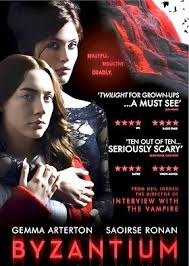
BYZANTIUM
Ireland, 2013, 117 minutes, Colour.
Gemma Arterton, Saoirse Ronin, Sam Riley, Daniel Mays, Caleb Landry Jones, Johnny Lee Miller, Tom Hollander, Maria Doyle Kennedy.
Directed by Neil Jordan.
Byzantium is an exotic entertainment from Irish director, Neil Jordan. It is a vampire entertainment for an adult audience. Jordan had already ventured into the adult vampire genre with his 1994, Interview with the Vampire. He had also ventured into the horror field with his film version of Angela Carter’s, Company of Wolves.
The setting here is south-eastern England. The drama takes place on the coast and on the beach and piers. Two sisters take refuge, one a prostitute who works in a strip bar, the other a younger sister, aged 16. They are played by Gemma Arterton and Saoirse Ronin. It emerges that they are vampires and, in fact, mother and daughter. The daughter is telling her story, writing it out for 200 years and then throwing away the text. In a restaurant, playing the piano, she befriends a young man, Frank (Caleb Landry Jones) to whom she gives a copy of her story. Matters become more complicated as she attends an education course and the director reads her story and interrogates her sister about the history.
Ella, the sister, will drink blood only from old people who are willing to die or people in similar circumstances. There is a crisis when Frank, who suffers from leukaemia, is bleeding, but she takes him to hospital where he recovers.
In the meantime, members of the Brotherhood of the vampires is pursuing the two women to destroy them. This leads to a number flashbacks, when Clare, the older, is working on the seashore, encounters two soldiers, opts to go off with one and becomes a prostitute. It emerges that one of the soldiers was wounded in battle but has come back to life, turned into a vampire in a ritual in a cave on an island where, when the turning happens, the cascades of water become blood.
When the pursuers catch up with the two women, there is a crisis for the older sister who became a vampire when it was forbidden. And Ella decides to turn Frank and, presumably, live happily ever after.
There is actually a great deal in the plot and the themes of this film, entertaining and interesting.
1. The impact of the film? A vampire film for adults? Comparisons with other such stories? And the comparison with the Hammer horror film which the characters watch the television sequence?
2. Neil Jordan, the range of his films, tastes? Vampires and Interview with Vampire? Horror with The Company of Wolves? In Dreams?
3. The use of vampire lore? The Brotherhood, the island for transformation, with its cascade of blood? Women excluded? Women being hunted down? Possibility of death – decapitation? Vampires moving in society, not detected? Adapting to the times? But not ageing? The secrecy?
4. Ella’s story, her narration, writing her story, tossing the pages away? The secret, contained? It her decision to show the story to Frank? His showing it to the teacher, to the social worker? Ella with an inner desire to reveal the story? The consequences?
5. The introduction to Ella and Claire, as sisters, travelling, trying to settle? The 200 years, surviving? Claire protecting Ella? Ella and her seeking out people, her nail, to pierce the skin and get blood? The encounter with the old man, her kindness and his willingness to die? The old lady and the hostel, the music and her death? her choosing only people who wish to die? Frank, the possibility of taking his blood?
6. Claire, the club, striptease, as a prostitute, her being pursued, the struggle, the decapitation? The decision to pack, to move?
7. The encounter with Noel, the pickup, his impotence, his grief at his mother’s death, talking with Claire, her sympathy? Taking them home? The old hotel, Byzantium? Then moving in, settling, Noel and Claire in the sexual relationship, Ella in her room, her privacy? Going out to the girls on the street and at the jetty, taking them in, the way they had been treated, setting up the brothel, the range of clients, the money?
8. Ella, knowing what her sister did, going for a walk, the seaside town, the pillars and tunnel, going into the cafe, playing the piano, Frank and his attention, praise? Their meeting, becoming friends, but her inability to reveal her secret? His leukaemia, the flow of the blood, the accident, Ella taking him home, the mother and her concern, the hospital, her visit and wanting it to be a secret from Frank?
9. The adult education class, the teacher, everybody reclining on the floor, remembering their past, speaking out? Ella and her dream? Her secrets? Writing the story again, giving it to Frank? The teacher and his reading it, coming to Byzantium, the discussions with Claire, the flashbacks, and his death? The social worker and her reading the story, interviewing Ella, trying to help, disbelieving?
10. The insertion of the flashbacks, Claire as a young girl, the encounter with Ruthven and Darville? Her work, on the shore, the shells? The period, the men on horses, her decisions? Going with Ruthven? The years passing, her becoming a prostitute, his visiting her? The madame? The surprise when Darville returned? Ruthven thinking he was dead? The flashback, Darville’s injuries during the war, his return, going to the island, climbing the cliff, into the cave, Darville’s experience of the blood, being drained, the cascade of blood in the waterfall? Asking Ruthven to get him water? Ruthven and his wanting to get the map, to be transformed? The irony of Claire getting it, going to the island herself and the experience?
11. Ella and her seeing the cloaked and bonneted girls walking along the beach? Seeing herself? Her experience in the orphanage, the cruelty of those in charge? Claire and the financial support of her daughter? Watching over the years? Ella in the orphanage, the strictness? Ruthven arriving, his violence and viciousness, the rape? Claire intervening, transforming her daughter at age 16?
12. The fact that Claire was Ella’s mother, the 200 years, passing as sisters? Protection?
13. The character of the adult education teacher, his classes, reading the manuscript, visiting Claire, the attraction, listening to the story, his death?
14. The return of Darville and his companions, the audience thinking they were the police, but the Brotherhood’s pursuit of the women, retracing the
women’s steps, the drained and dead bodies? The buildup to the confrontation? Frank and his presence? Darville and his not executing Claire but his companion?
15. Ella, her attitude towards her mother, the separation, her future with the Darville saving her?
16. Ella, taking Frank to the island, this cascade of blood?
17. An intriguing adult vampire story?
Published in Movie Reviews
Published in
Movie Reviews
Tagged under
Saturday, 18 September 2021 19:49
Only Lovers Left Alive
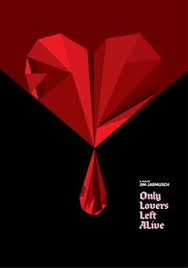
ONLY LOVERS LEFT ALIVE
US, 2013, 117 minutes, Colour.
Tilda Swinton, Tom Hiddleston, Mia Wasikowska, Anton Yelchin, John Hurt, Jeffrey Wright.
Directed by Jim Jarmusch.
In recent years, there seems to be a multi-presence of vampires in books, television programs, films. Is this a subconscious longing for readers and viewers for some kind of immortality? With many of the answers on offer, vampire immortality is not something to be sought. However, the two vampires in this film lead very comfortable lives, as long as the blood supply is readily available.
This is a vampire film for adult audiences. Teen audiences have been able to enjoy the Twilight series and popular comedies like Vampire Academy. Those with a taste for more violent stories have been amply catered for, especially with the television series, True Blood. But what about adults? There have been some adult vampire films but not so many. One of the much better adult vampire films, Byzantium, directed by Neil Jordan, failed to get cinema release in some countries. Actually, this reviewer would recommend Byzantium instead of Only Lovers Left Alive.
Jim Jarmusch is the writer and director here, an idiosyncratic film-maker for the last 30 years, working in a wide range of genres. While his story is rather simple: centuries-old married couple, one living in Tangiers, the other in Detroit, meet up again, enjoy each other’s company, are disturbed by the visit of a free-wheeling sister who wreaks a bit of havoc, including draining her potential boyfriend, and is ousted, the couple deciding to return to Tangiers. And, in Tangiers, they have a great friend, Kit Marlowe, in fact the celebrated playwright, Christopher Marlowe (John Hurt).
The film was very stylish in its visuals, everything happening at night, the creative use of colour, camera angles, editing. The film was also very stylish in the range of the musical score, quite different styles of music as background to a variety of sequences. But the language… this is a great drawback for some audiences who have a more cultivated sensibility. But with the proliferation of four letter expletives, some of the dialogue, especially from the husband, becomes irritating and tiresome – surely a film-maker like Jim Jarmusch has a wider range of creative vocabulary at hand instead of the lazy approach of four letter substitutes. This coarsens the impact of the film and the characters.
Tilda Swinton is the wife, a cultured woman, adept at speed reading and so absorbing a great deal of knowledge, as well as enjoying her friendship with Christopher Marlowe. Tom Hiddleston is the husband, the composer living in the Motown capital, adapting to contemporary musical styles, with a large number of guitars, many of them supplied by a young man in Detroit, Ian, played by Anton Yelchin. The troublesome sister, all 21st century attitudes, language and narcissism, whose last annoyance to the couple was in Paris 87 years earlier! is played by Mia Waskikowska.
There is a doctor in Detroit, played by Jeffrey Wright, who is not above supplying specialist blood for a cash price. Since there are literary allusions in the film, the couple being called Adam and Eve, there are jokes between Adam and the doctor with all kinds of literary references to various doctors, including Dr Faustus.
Which means that the film is one of atmosphere rather than significant plot, a film that plays on vampire traditions and overturning them or parodying them – although, the quest for blood and survival remains very serious. Many will like this film – and, probably, many will not.
1. The 21st century popularity of vampire stories, novels, television, films? The reason for the popularity? The tradition of vampire stories? The tradition of vampire films? This film for an adult audience, arthouse audience? The differences from other films?
2. Jim Jarmusch and his career, imagination, the blend of the serious, the comic, offbeat?
3. The importance of his visuals, the visual style, camera work and angles, editing and pace, seems only at night? In Tangiers, in Detroit, apartments, the contents and clutter, the streets, exotic Africa, downtown Detroit, the buildings, the clubs?
4. Importance of music, the range of the score, the various moods for atmosphere?
5. The language, at times elevated, how contemporary for vampires, American slang and jargon, coarse language?
6. The plausibility of the plot? Adult vampires? Their being turned? Their lives over the centuries, living only at night, yet ordinary and blending? Eve and her reading, speed reading, educated? Adam and his music, composing? The travelling at night? The friendship with Christopher Marlowe – that Christopher Marlowe?
7. Adam and Eve, and Ava, Kit Marlowe, and the various jokes about the doctors, literary?
8. Eve’s life, in comfort, Tangiers and its atmosphere Western Mark her friendship with Kit, the discussions, his career? The need for blood? His special blood? Her phone calls to Adam? Her relationship with him, love for him?
9. At, Detroit, composing the music, his many instruments, his friendship with Ian, Ian bringing the instruments and Adam delighted with them? His isolation? Asking for the Broughton bullet? The phone call with Eve?
10. Eve, the travel arrangements, coming to Detroit, the atmosphere of Detroit, the bankrupt city, a decaying city?
11. Adamant Eve, their love, memories of their weddings, over the centuries, comfortable with each other? Tender? Eve as literate? Adam as 21st-century cool? His attitudes, intolerance, his language?
12. Ian, his help, his puzzles about at, admiring him?
13. Ava, a young vampire, memories of Paris and her misdemeanours? The 21st century style, clothes, attitudes, the need for blood? Including? Inconsiderate? Going out, dancing at the club, meeting with Ian, bringing him back home, they’re trashing the room, her being ousted? Her turning Ian and her lack of control? Departure?
14. The Dr, the friendship with at, the laboratory, getting the blood, taking the cash? The jokes about the various literary doctors?
15. The couple leaving Detroit, the travel arrangements, at night, in the plane, the need for blood, getting weaker, arriving in Tangiers, the taxi, walking the streets on the steps? Going to seek Kit, discovering him ill, the discussions, his death? The few drops of blood?
16. The couple in the Street, Adam and Eve and their decision, the approach to the couple – turning them?
17. Atmosphere versus plot? The treatment of the vampire story? Whether any deeper meanings?
Published in Movie Reviews
Published in
Movie Reviews
Tagged under